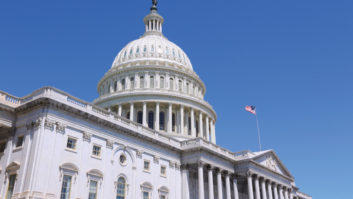The NAB was in court this past week trying to convince a three-judge panel to toss the FCC’s broadcast ownership regulations.
The Eighth Circuit Court of Appeals in St. Paul, Minn., heard oral arguments on Wednesday. The court will decide the outcome of the NAB’s legal challenge to the ownership caps set by the FCC in the 2018 Quadrennial Review — which was adopted by a 3-2 vote by the commission, then led by Democrats, in 2023.
The FCC voted at the time to maintain the status quo set by the Local Radio Ownership Rule, which sets a limit of up to eight radio stations per market per owner, with no more than five in the same band in the largest markets. The cap shrinks as market size decreases.
The NAB and several broadcast companies argued this week that outdated ownership regulations hinder local stations’ ability to serve their communities, innovate and compete with Big Tech. In addition, the current rules don’t reflect today’s media marketplace.
Attorney Andrew Kilberg, who argued the case on behalf of the NAB, told the three-judge panel that “broadcasters today are struggling to survive against this onslaught of new competition.”
Kilberg focused on how much competition has changed through the decades, and how listeners “are no longer limited to the radio or cassette tape.” He continued: “Instead, you can choose from millions of songs, podcasts and audio books on Spotify, Pandora and Apple Music.”
Kilberg told the judges that the commission ignored the requirements of the 1996 Telecom Act when it kept the caps in place in 2023. “The commission was only able to get to that result by irrationally defining the relevant markets in a way that permanently excludes from its analysis all of these new sources of competition,” Kilberg said.
FCC attorney James Carr told the judges that competition must be viewed through the prism of the public interest. Carr said the 2023 decision was guided by the goals of competition, localism and viewpoint diversity.
“I think it’s important to look at the way the statute is written,” Carr said. “The commission has an obligation every four years to take a look at the changes in the marketplace and to determine whether any of its media ownership rules are quite necessary in the public interest as the result of competition.”
The court of appeals ultimately will decide if the FCC is correct to continue to view radio and TV as a distinct market and not part of a wider ecosystem of entertainment platforms, the lawyers argued.
Carr told the judges the commission has acknowledged there is plenty of competition coming from non-broadcast sources.
The key question, Carr told the judges, is whether competitive changes in the marketplace have created a situation where free market forces alone are sufficient to achieve the public interest goals that the rules intended.
Carr said: “The commission looked at that question here and made a determination that at this point, no, the competition that is out there in the marketplace has not changed to such an extent that the rules should either be eliminated or modified in any way to loosen the limits.”
In a blog recapping its arguments, the NAB said FCC regulations prevent local TV and radio stations from being able to grow and provide new services, while their Big Tech competitors are subject to no such rules.
The group has advocated for the FCC to abolish AM radio ownership caps while raising the FM limits in big markets. The NAB argues big tech like Spotify, Amazon and Apple and even SiriusXM continue to consolidate power unchecked while broadcasters remain burdened by outdated restrictions that limit their ability to grow and innovate.
“While the case plays out in court, one fact remains unchanged: these decades-old regulations are putting the future of your local radio and TV stations in jeopardy. Without reform, local stations will struggle to survive when they cannot compete with tech giants for advertising and sports rights,” NAB said in its blog.
The local radio rule has remained largely unchanged since 1996; however, the Republican-led FCC has indicated a willingness to throw out the regulatory playbook. FCC Chair Brendan Carr voted no on the quadrennial review, which means that in the current case, FCC attorneys are in court defending a decision that the new chairman voted against.
Comment on this or any article. Email [email protected].






